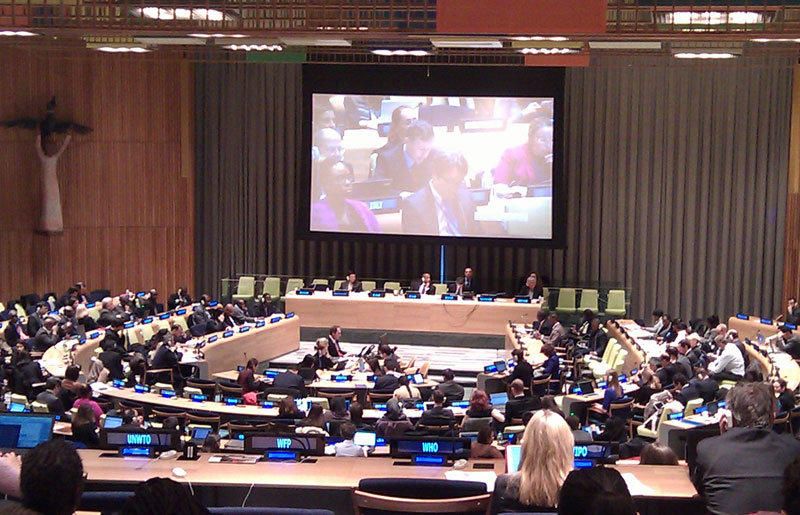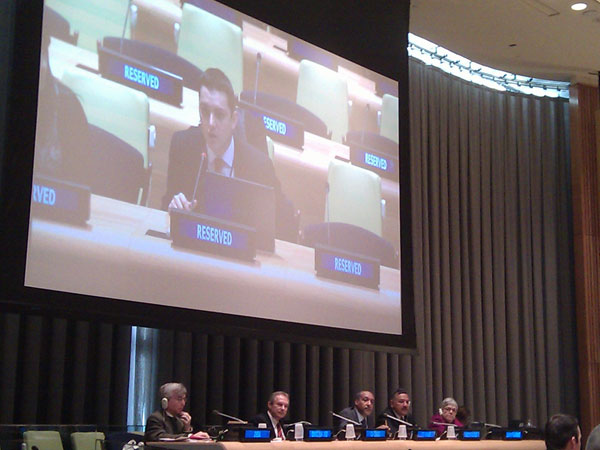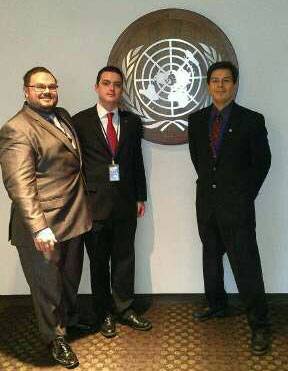

A Delegation from Utah Valley University (UVU) as a part of established tradition visited the United Nations, in New York during December 9-11, 2013. It participated in the Sixth session of the Open Working Group Meeting on Sustainable Development Goals, under the accreditation of the mission of Hungary at the United Nations, one of the Co-Chairs of the meeting, the other being Kenya. The members of the delegation included Dr. Rusty Butler (Associate Vice President International Affairs and Diplomacy at UVU), Dr. Brian Birch (Associate Vice President – Engaged Learning at UVU), Carlos Alarco (Educational Technologist and representative of UIMF (Utah International Mountain Forum), a coalition of student clubs at UVU) and Jesler Molina (International Student Council Chair, Model UN President at UVU, and representative of UIMF).
During the 3 days the delegation heard informative and insightful opinions by delegates from across the globe, as well as numerous civil society groups, all working together to come up with targets and goals that would comprise the Sustainable Development Goals for the post 2015 agenda. The meetings held during these 5 days were critical as it allowed delegates to voice ideas and concerns into what these goals should include. The four main themes were discussed: Means of Implementation, Global partnership, Countries in special situations, and Human Rights (including right to development and global governance).

Open Working Group session on Sustainable Development Goals
The first day’s discussion focused on the importance of means of implementation for sustainable development. Science, Technology and Innovation are seen as drivers of social and economic development. Another important theme discussed was about how ODA (Official Development Assistance) remains an essential source of financing, especially for LDCs (Least Developed Countries), and that more needs to be done to make sure this type of funding increases instead of decreases, which had been happening recently. South-South and triangular cooperation are growing around the world, especially as a supplement to North-South cooperation. While a technology divide still exists between developed and developing countries and more needs to be done to bridge this divide, any solution needs to include women. Technology transfer is important to LDCs not only as a means to acquire sustainable technologies, but also as an opportunity to include capacity development, local productive capability, and supportive institutions. As a result, when a technology bank for LDCs (least Developed Countries) as well as a technology facilitation mechanism were proposed, both initiatives received wide support among the audience. The importance of a rule-based, multilateral, trade system to benefit all countries would help LDCs move towards sustainable development.
The second day of the discussion focused on Global Partnerships and the involvement of the private sector in developing nations in order to achieve sustainable development goals. One of the speakers that day was Paul Polman (CEO Unilever), and his presentation outlined the importance of private corporations in any development plan and implementation. In Mr. Polman’s opinion, state and international organizations, like the U.N, need to work with the private companies because they have the resources but not enough manpower to do practical tasks that sustainable development require. Partnerships need not involve many companies, only few of them are necessary to push for ideas that help or change the world. In his view, it is enough to have companies that can be held accountable and commit themselves to any collaborative project. He gave the example that 2 million children die each year because they do not have access to soap to wash their hand. Unilever produces soap, and other sanitary products, but not the training to show children how to wash their hands properly. Partnering with State entities and NGOs can prove beneficial in these instances as they help to advance the development goals and of course their business. However, it is not easy to talk about sustainability with the private sector, due to the fact that new technologies can initially be expensive, but here the private sector has an opportunity to make a significant impact on developing communities and push for a change in culture. The U.N can set a moral framework that can hold all actors accountable to it. This was echoed during the rest of the discussion when other participants emphasized that private sector should be part of the solution and that the contribution of the private sector can be enhanced with better governance and regulation. There is the potential to expand multi-stakeholder partnerships in the support of specific goals and that governments play a key role in creating enabling environments for these partnerships. Later during that day the UVU delegation had the opportunity to discuss the situation in Africa in relation to LDCs, LLDCs and DCs during the lunch with the Ambassador of the Republic of Botswana Charles T. Ntwaagae and the Deputy Permanent Representative Nkoloi Nkoloi.
On the third day, the discussion was focused on Countries in Special Situations, which included LDCs (Least Developed Countries), LLDCs (Land Locked Developing Countries) and SIDS (Small Island Developing States) and the means these groups have to be provided for Sustainable Development. During the Co-chairs’ meeting with representatives of Major Groups and other stakeholders, the UVU delegation contributed to the discussion on the day’s topic. Jesler Molina made an official statement on behalf of UVU. In his speech, Jesler as a practical measure called for intergovernmental collaboration to facilitate LLDC countries access to the sea and water channels through a comprehensive taxation program for their products, allowing them to have access to the international markets and helping them to improve their economy. He also recommended the group to review the LDC standard and to provide a middle ground for graduate LDC and non-graduate LDC countries, where the economies are fragile and could be put in serious danger at any time.

Jesler Molina makes his statement to the committee
( Statement to U.N )
Jesler Molina and Dr. Rusty Butler also attended a special lunch hosted by the mission of Argentina to the United Nations on December 11, 2013 dedicated to the International Mountain Day celebration. As a part of the gathering a special publication commemorating International Year of Family Farming, which will be the theme for 2014, was presented to the audience. During the event UVU delegation had an opportunity to meet with representatives of international organizations, including RosaLaura Romeo, Mountain Partnership Secretariat Programme Officer and envoys from such mountain countries, as the Permanent Representative of Peru to the United Nations, Gustavo Meza-Cuadra Velásquez, the Permanent Representative of Spain to the United Nations Fernando Arias González, the Permanent Representative of the Kyrgyz Republic to the United Nations, H.E. Talaibek Kydyrov, and the Permanent Representative of Morocco to the United Nations Ahmed Snoussi. At the end, the UVU delegation extended an invitation to the Permanent Representative of Argentina to the United Nations María Cristina Perceval to visit Utah Valley University as a part of the International Affairs and Diplomacy program.
The UVU delegation also met with Joseph McCain, a member of UIMF currently serving an internship with the Kyrgyz Mission to the United Nations.

Joseph McCain, Jesler Molina, and Carlos Alarco,
UIMF representatives at the United Nations
The trip was a resounding success as the UVU delegation was able to interact with Ambassadors and representatives from many nations and had an opportunity to share before the U.N. audience and officials UVU experiences in promoting sustainable development agenda with particular focus on mountain cause. The delegation expects that there will be many more opportunities for future interaction with UN missions, the UN and other NGOs.
Carlos Alarco and Jesler Molina, representatives of UIMF
***
Official statement made by Jesler Molina during the sixth session of the Open Working Group

